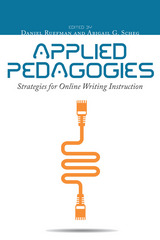
This is a practical text, providing ways to employ the best instructional strategies possible for today’s diverse and dynamic digital writing courses. Organized into three sections—Course Conceptualization and Support, Fostering Student Engagement, and MOOCs—chapters explore principles of rhetorically savvy writing crossed with examples of effective digital teaching contexts and genres of digital text. Contributors consider not only pedagogy but also the demographics of online students and the special constraints of the online environments for common writing assignments.
The scope of online learning and its place within higher education is continually evolving. Applied Pedagogies offers tools for the online writing classrooms of today and anticipates the needs of students in digital contexts yet to come. This book is a valuable resource for established and emerging writing instructors as they continue to transition to the digital learning environment.
Contributors: Kristine L. Blair, Jessie C. Borgman, Mary-Lynn Chambers, Katherine Ericsson, Chris Friend, Tamara Girardi, Heidi Skurat Harris, Kimberley M. Holloway, Angela Laflen, Leni Marshall, Sean Michael Morris, Danielle Nielsen, Dani Nier-Weber, Daniel Ruefman, Abigail G. Scheg, Jesse Stommel

Brave New Digital Classroom deftly interweaves results of pedagogical research and descriptions of the most successful computer-assisted language learning (CALL) projects to explore how technology can best be employed in the foreign-language curriculum to assist the second language acquisition process.
Directed to all language teachers—whether at the school or the postsecondary level, with or without prior experience—this book focuses on how to use new technologies effectively. Blake urges teachers to move beyond a simple functional competence of knowing how to use the tools toward first a critical competence—realizing what the various tools are good for—and ultimately a rhetorical competence of knowing how the tools will help transform the learning environment. This book examines the effective use of a range of technologies, from Internet sites through computer-mediated communication such as synchronous chatting and blogs, to distance learning. At the end of each chapter questions and activities demonstrate the interactionist, learner-centered pedagogy Blake espouses.
An invaluable reference for experienced researchers and CALL developers as well as those of limited experience, Brave New Digital Classroom is also ideal for graduate-level courses on second language pedagogy. It will also be of interest to department chairs and administrators seeking to develop and evaluate their own CALL programs.
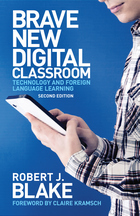
Brave New Digital Classroom examines the most effective ways to utilize technology in language learning. The author deftly interweaves the latest results of pedagogical research with descriptions of the most successful computer-assisted language learning (CALL) projects to show how to implement technology in the foreign language curriculum to assist the second language acquisition process.
This fully updated second edition includes new chapters on the latest electronic resources, including gaming and social media, and discusses the realities and potential of distance learning for second language acquisition. The author examines the web, CALL applications, and computer-mediated communication (CMC), and suggests how the new technologically assisted curriculum will work for the foreign-language curriculum. Rather than advocating new technologies as a replacement for activities that can be done equally well with traditional processes, the author envisions a radical change as teachers rethink their strategies and develop their competence in the effective use of technology in language teaching and learning.
Directed at all language teachers, from the elementary school to postsecondary levels, the book is ideal for graduate-level courses on second language pedagogy. It also serves as an invaluable reference for experienced researchers, CALL developers, department chairs, and administrators.

Robert Blake, now with Gabriel Guillén, updates his successful book (1st ed. 2008, 2nd ed. 2013) on how to teach foreign languages using technology. Brave New Digital Classroom touches on all of the key concepts and challenges of teaching with technology, focusing on issues specific to FLL or L2 learning and CALL. Originally referred to as computer-assisted language learning, CALL has come to encompass any kind of learning that uses digital tools for language learning.
This edition reframes the conversation to account for how technology has been integrated into our lives. Blake and Guillén address the ways technology can help with L2, how to choose the right digital tools, how to use those tools effectively, and how technology can impact literacy and identity. The book is primed for use in graduate courses: terminology is in bold and a comprehensive glossary is included; each chapter finishes with a short list of references for further reading on the topic and discussion questions. The authors provide short interview videos (free via GUP website) to enhance discussions on each chapter’s topic.
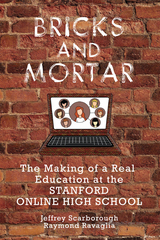
This volume shows how a group of online-learning believers built the best high school in the world without laying a single brick: the Stanford Online High School (SOHS). By chronicling SOHS’s distinctive approach to curriculum, gifted education, and school community over SOHS’s first seven years, Bricks and Mortar makes the case that the dynamic use of technology and the best traditional methodologies in education are not, in fact, mutually exclusive. Indeed, while SOHS has redefined what is possible online, a great education is ultimately the product of an interactive community of teachers and students.
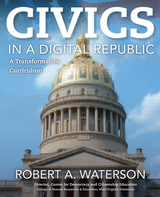
This innovative curriculum book provides key materials, resources, and tools to help secondary educators prepare their students to be engaged citizens of their community, state, nation and world. Five complete units of instruction, based on West Virginia Content Standards and Objectives, provide meaningful lessons while being mindful of the transition from tangible text to more digital curricula:
•Rights of the Individual•Freedoms of the Individual
•Responsibilities of the Individual
•Beliefs Concerning Societal Conditions
•Financial Literacy
•4 culminating activities for enrichment opportunities
•A matrix illustrating the West Virginia Content Standards and Objectives covered
•A matrix illustrating compliance with the National Council for the Social Studies Standards
•A curriculum toolbox that provides over 70 engaging web sites to visit and explore.
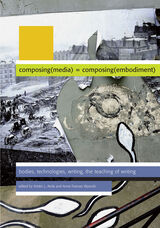
“What any body is—and is able to do—cannot be disentangled from the media we use to consume and produce texts.” ---from the Introduction.
Kristin Arola and Anne Wysocki argue that composing in new media is composing the body—is embodiment. In Composing (Media) = Composing (Embodiment), they havebrought together a powerful set of essays that agree on the need for compositionists—and their students—to engage with a wide range of new media texts. These chapters explore how texts of all varieties mediate and thereby contribute to the human experiences of communication, of self, the body, and composing. Sample assignments and activities exemplify how this exploration might proceed in the writing classroom.
Contributors here articulate ways to understand how writing enables the experience of our bodies as selves, and at the same time to see the work of (our) writing in mediating selves to make them accessible to institutional perceptions and constraints. These writers argue that what a body does, and can do, cannot be disentangled from the media we use, nor from the times and cultures and technologies with which we engage.
To the discipline of composition, this is an important discussion because it clarifies the impact/s of literacy on citizens, freedoms, and societies. To the classroom, it is important because it helps compositionists to support their students as they enact, learn, and reflect upon their own embodied and embodying writing.
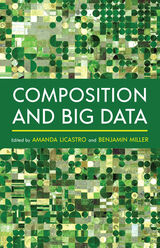
In a data-driven world, anything can be data. As the techniques and scale of data analysis advance, the need for a response from rhetoric and composition grows ever more pronounced. It is increasingly possible to examine thousands of documents and peer-review comments, labor-hours, and citation networks in composition courses and beyond. Composition and Big Data brings together a range of scholars, teachers, and administrators already working with big-data methods and datasets to kickstart a collective reckoning with the role that algorithmic and computational approaches can, or should, play in research and teaching in the field. Their work takes place in various contexts, including programmatic assessment, first-year pedagogy, stylistics, and learning transfer across the curriculum. From ethical reflections to database design, from corpus linguistics to quantitative autoethnography, these chapters implement and interpret the drive toward data in diverse ways.
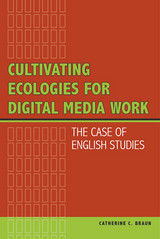
Braun’s in-depth study documents English professors and the challenges they face in both career and classroom as they attempt to gain appropriate value for digital teaching and creation within their field, departments, and institutions. Braun proposes that to move English studies into the future, three main questions must be addressed. First, what counts as a text? How should we approach the reading of texts? Finally, how should we approach the production of texts? In addition to reconsidering the nature of texts in English studies, she calls for crucial changes in higher-education institutional procedures themselves, including new methods of evaluating digital scholarship on an even playing field with other forms of work during the processes for promotion and tenure.
With insightful expertise, Braun analyzes how the new age of digital scholarship not only complements the traditional values of the English studies discipline but also offers constructive challenges to old ideas about texts, methods, and knowledge production. Cultivating Ecologies for Digital Media Work is the first volume to offer specific examination of the digital shift’s impact on English studies and provides the scaffold upon which productive conversations about the future of the field and digital pedagogy can be built.

This collection of essays focuses on teaching at the intersection of early modern literature, book history, and digital media. It considers how teaching different fields and methods of study can be enhanced and facilitated by digital technologies. The volume provides a snapshot of current thinking on digital pedagogy as practiced by leading scholars in the field and offers a series of models that may be adapted, personalized, and repurposed by future teachers seeking to bring digital methodologies to their classrooms. Supplementary materials for this title are available on the Iter Press website (iterpress.org): see under Books/Supplementary Materials.
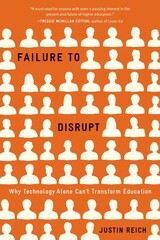
A Science “Reading List for Uncertain Times” Selection
“A must-read for anyone with even a passing interest in the present and future of higher education.”
—Tressie McMillan Cottom, author of Lower Ed
“A must-read for the education-invested as well as the education-interested.”
—Forbes
Proponents of massive online learning have promised that technology will radically accelerate learning and democratize education. Much-publicized experiments, often underwritten by Silicon Valley entrepreneurs, have been launched at elite universities and elementary schools in the poorest neighborhoods. But a decade after the “year of the MOOC,” the promise of disruption seems premature.
In Failure to Disrupt, Justin Reich takes us on a tour of MOOCs, autograders, “intelligent tutors,” and other edtech platforms and delivers a sobering report card. Institutions and investors favor programs that scale up quickly at the expense of true innovation. Learning technologies—even those that are free—do little to combat the growing inequality in education. Technology is a phenomenal tool in the right hands, but no killer app will shortcut the hard road of institutional change.
“I’m not sure if Reich is as famous outside of learning science and online education circles as he is inside. He should be…Reading and talking about Failure to Disrupt should be a prerequisite for any big institutional learning technology initiatives coming out of COVID-19.”
—Inside Higher Ed
“The desire to educate students well using online tools and platforms is more pressing than ever. But as Justin Reich illustrates…many recent technologies that were expected to radically change schooling have instead been used in ways that perpetuate existing systems and their attendant inequalities.”
—Science
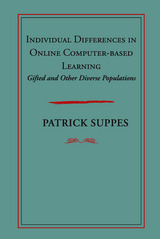
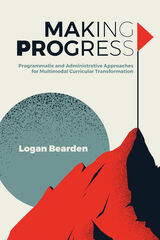
MCT can be achieved at the intersection of program documents and practices. Bearden details ten composition programs that have undergone MCT, offering interview data from the directors who oversaw and/or participated within the processes. He analyzes a corpus of outcomes statements to discover ways we can “make space” for multimodality and gives instructors and programs a broader understanding of the programmatic values for which they should strive if they wish to make space for multimodal composition in curricula. Making Progress also presents how other program documents like syllabi and program websites can bring those outcomes to life and make multimodal composing a meaningful part of first-year composition curricula.
First-year composition programs that do not help their students learn to compose multimodal texts are limiting their rhetorical possibilities. The strategies in Making Progress will assist writing program directors and faculty who are interested in using multimodality to align programs with current trends in disciplinary scholarship and deal with resistance to curricular revision to ultimately help students become more effective communicators in a digital-global age.
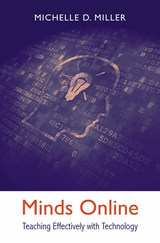
From wired campuses to smart classrooms to massive open online courses (MOOCs), digital technology is now firmly embedded in higher education. But the dizzying pace of innovation, combined with a dearth of evidence on the effectiveness of new tools and programs, challenges educators to articulate how technology can best fit into the learning experience. Minds Online is a concise, nontechnical guide for academic leaders and instructors who seek to advance learning in this changing environment, through a sound scientific understanding of how the human brain assimilates knowledge.
Drawing on the latest findings from neuroscience and cognitive psychology, Michelle Miller explores how attention, memory, and higher thought processes such as critical thinking and analytical reasoning can be enhanced through technology-aided approaches. The techniques she describes promote retention of course material through frequent low‐stakes testing and practice, and help prevent counterproductive cramming by encouraging better spacing of study. Online activities also help students become more adept with cognitive aids, such as analogies, that allow them to apply learning across situations and disciplines. Miller guides instructors through the process of creating a syllabus for a cognitively optimized, fully online course. She presents innovative ideas for how to use multimedia effectively, how to take advantage of learners’ existing knowledge, and how to motivate students to do their best work and complete the course.
For a generation born into the Internet age, educational technology designed with the brain in mind offers a natural pathway to the pleasures and rewards of deep learning.
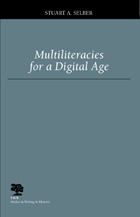
Just as the majority of books about computer literacy deal more with technological issues than with literacy issues, most computer literacy programs overemphasize technical skills and fail to adequately prepare students for the writing and communications tasks in a technology-driven era. Multiliteracies for a Digital Age serves as a guide for composition teachers to develop effective, full-scale computer literacy programs that are also professionally responsible by emphasizing different kinds of literacies and proposing methods for helping students move among them in strategic ways.
Defining computer literacy as a domain of writing and communication, Stuart A. Selber addresses the questions that few other computer literacy texts consider: What should a computer literate student be able to do? What is required of literacy teachers to educate such a student? How can functional computer literacy fit within the values of teaching writing and communication as a profession? Reimagining functional literacy in ways that speak to teachers of writing and communication, he builds a framework for computer literacy instruction that blends functional, critical, and rhetorical concerns in the interest of social action and change.
Multiliteracies for a Digital Age reviews the extensive literature on computer literacy and critiques it from a humanistic perspective. This approach, which will remain useful as new versions of computer hardware and software inevitably replace old versions, helps to usher students into an understanding of the biases, belief systems, and politics inherent in technological contexts. Selber redefines rhetoric at the nexus of technology and literacy and argues that students should be prepared as authors of twenty-first-century texts that defy the established purview of English departments. The result is a rich portrait of the ideal multiliterate student in a digital age and a social approach to computer literacy envisioned with the requirements for systemic change in mind.

Over the past two decades the concepts of multimodal composing and writing transfer have grown and reshaped the nature of writing studies, but rarely have the ways in which these areas overlap been studied. This collection shows how this shift in writing studies has been mutually informative, covering a wider range of contexts for multimodality and writing transfer than just in first-year composition courses. It places composition teaching practices and multimodal research in conversation with learning transfer theory to provide an in-depth examination of how they influence one another.
Multimodal Composing and Writing Transfer develops these intersections to connect multimodal composition and writing practices across a wide array of fields and contexts. Scholars across disciplines, postsecondary writing teachers, writing program administrators, writing center directors, and graduate students will find this collection indispensable.
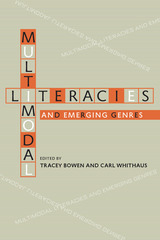
of meaningmaking?
Today, multiple modes of communication and information technology are challenging pedagogies in composition and across the disciplines. Writing instructors grapple with incorporating new forms into their curriculums and relating them to established literary practices. Administrators confront the application of new technologies to the restructuring of courses and the classroom itself.
Multimodal Literacies and Emerging Genres examines the possibilities, challenges, and realities of mutimodal composition as an effective means of communication. The chapters view the ways that writing instructors and their students are exploring the spaces where communication occurs, while also asking “what else is possible.” The genres of film, audio, photography, graphics, speeches, storyboards, PowerPoint presentations, virtual environments, written works, and others are investigated to discern both their capabilities and limitations. The contributors highlight the responsibility of instructors to guide students in the consideration of their audience and ethical responsibility, while also maintaining the ability to “speak well.” Additionally, they focus on the need for programmatic changes and a shift in institutional philosophy to close a possible “digital divide” and remain relevant in digital and global economies.
Embracing and advancing multimodal communication is essential to both higher education and students. The contributors therefore call for the examination of how writing programs, faculty, and administrators are responding to change, and how the many purposes writing serves can effectively converge within composition curricula.

A new approach to training and evaluating world languages online instructors
The rapid growth in online world language programs in the United States coupled with the widespread implementation of virtual teaching in response to COVID-19 have pushed the field to reconceive instruction. Virtual learning creates unique challenges for instructors, who need to ensure that their students have adequate interaction with their peers, their professor, and native speakers of the language. Even with a growing demand for online language courses, there are few tools that evaluate the training and assessment of online language instructors.
In Online World Language Instruction Training and Assessment, authors Carmen King Ramírez, Barbara A. Lafford, and James E. Wermers fill that gap, providing a critical pedagogical approach to computer-assisted language learning (CALL) teacher education (CTE). By combining best CTE training and evaluation practices with assessment tools, the authors explain how teachers can integrate technology to build successful online programs. Their ecological, holistic approach addresses all facets of learning online—including pressing challenges of moving courses online, teacher training, developing core competencies and skills, instructions for assessment and self-evaluation, goal setting, and the normalization of critical CTE practices in an increasingly digital environment.
The authors propose new solutions to teacher training challenges, providing extensive rubrics and tools that can equitably assess online language instructor skills, the training they receive, the assessment process they undergo, and the instruments used for instructor assessment. A list of CALL and CTE resources (available on the Press’s website) further supports readers’ successful adaptation to an everchanging learning environment.
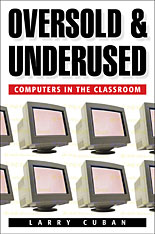
Impelled by a demand for increasing American strength in the new global economy, many educators, public officials, business leaders, and parents argue that school computers and Internet access will improve academic learning and prepare students for an information-based workplace.
But just how valid is this argument? In Oversold and Underused, one of the most respected voices in American education argues that when teachers are not given a say in how the technology might reshape schools, computers are merely souped-up typewriters and classrooms continue to run much as they did a generation ago. In his studies of early childhood, high school, and university classrooms in Silicon Valley, Larry Cuban found that students and teachers use the new technologies far less in the classroom than they do at home, and that teachers who use computers for instruction do so infrequently and unimaginatively.
Cuban points out that historical and organizational economic contexts influence how teachers use technical innovations. Computers can be useful when teachers sufficiently understand the technology themselves, believe it will enhance learning, and have the power to shape their own curricula. But these conditions can't be met without a broader and deeper commitment to public education beyond preparing workers. More attention, Cuban says, needs to be paid to the civic and social goals of schooling, goals that make the question of how many computers are in classrooms trivial.
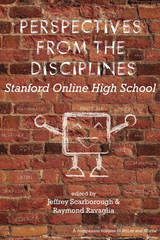

However exciting new technologies and educational tools may seem, they can become solely for entertainment unless their design, use, and evaluation are guided by principles of education and language development. Task-based Language Teaching (TBLT) provides an excellent approach for teachers who want to realize the potential of technology to engage learners and improve language learning inside and outside the classroom.
This practical guide shows teachers how to successfully incorporate technology into TBLT in the classroom and to develop technology-mediated materials. Whether the goal is to conduct a needs analysis, to develop classroom or homework materials, or to implement a new approach of student assessment, A Practical Guide to Integrating Technology into Task-Based Language Teaching will be a welcome resource for language teachers at all levels.
Designed for use in the classroom as well as for independent study, the book includes reflective questions, activities, and further reading at the end of each chapter. Examples of units in Chinese, Spanish, ESL, and the hospitality industry are provided.
Georgetown Digital Shorts—longer than an article, shorter than a book—deliver timely works of peer-reviewed scholarship for a fast-paced world. They present new ideas and original content that are easily digestable for students, scholars, and general readers.
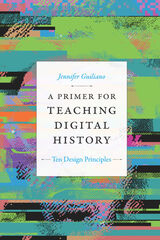
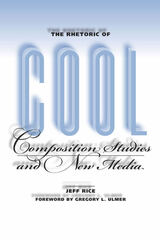
The Rhetoric of Cool addresses the disciplinary claim that composition studies underwent a rebirth in 1963. At that time, three writers reviewed technology, cultural studies, and visual writing outside composition studies and independently used the word cool to describe each position. Starting from these three positions, Rice focuses on chora, appropriation, commutation, juxtaposition, nonlinearity, and imagery—rhetorical gestures conducive to new media work-- to construct the rhetoric of cool.
An innovative work that approaches computers and writing issues from historical, critical, theoretical, and practical perspectives, The Rhetoric of Cool challenges current understandings of writing and new media and proposes a rhetorical rather than an instrumental response for teaching writing in new media contexts.

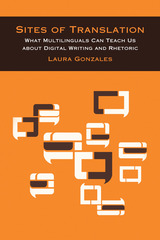
Winner of the 2016 Sweetland Digital Rhetoric Collaborative Book Prize
Sites of Translation illustrates the intricate rhetorical work that multilingual communicators engage in as they translate information for their communities. Blending ethnographic and empirical methods from multiple disciplines, Laura Gonzales provides methodological examples of how linguistic diversity can be studied in practice, both in and outside the classroom, and provides insights into the rhetorical labor that is often unacknowledged and made invisible in multilingual communication. Sites of Translation is relevant to researchers and teachers of writing as well as technology designers interested in creating systems, pedagogies, and platforms that will be more accessible and useful to multilingual audiences. Gonzales presents multilingual communication as intellectual labor that should be further valued in both academic and professional spaces, and supported by multilingual technologies and pedagogies that center the expertise of linguistically diverse communicators.
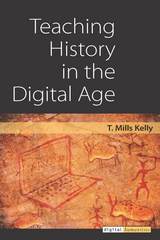
Teaching History in the Digital Age serves as a guide for practitioners on how to fruitfully employ the transformative changes of digital media in the research, writing, and teaching of history. T. Mills Kelly synthesizes more than two decades of research in digital history, offering practical advice on how to make best use of the results of this synthesis in the classroom and new ways of thinking about pedagogy in the digital humanities.
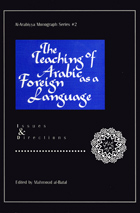
In this volume leading teachers of Arabic, many of whom have written influential textbooks for advanced learners, explore the realities and challenges of teaching Arabic as a foreign language. Topics covered include the state of the Arabic teaching profession; the institutional challenges in U.S. and study-abroad programs; the teaching of various skills such as writing, reading, speaking, and listening; the varieties of Arabic and their relevance in the classroom; the uses of technology in the classroom; and testing. Published in 1995, many of the issues raised in this volume remain relevant today.
Distributed for the American Association of Teachers of Arabic
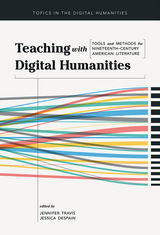
Travis and DeSpain curate conversations on the value of project-based, collaborative learning; examples of real-world assignments where students combine close, collaborative, and computational reading; how digital humanities aids in the consideration of marginal texts; the ways in which an ethics of care can help students organize artifacts; and how an activist approach affects debates central to the study of difference in the nineteenth century.
A supplemental companion website with substantial appendixes of syllabi and assignments is now available for readers of Teaching with Digital Humanities.
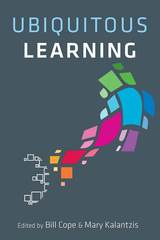
This collection seeks to define the emerging field of "ubiquitous learning," an educational paradigm made possible in part by the omnipresence of digital media, supporting new modes of knowledge creation, communication, and access. As new media empower practically anyone to produce and disseminate knowledge, learning can now occur at any time and any place. The essays in this volume present key concepts, contextual factors, and current practices in this new field.
Contributors are Simon J. Appleford, Patrick Berry, Jack Brighton, Bertram C. Bruce, Amber Buck, Nicholas C. Burbules, Orville Vernon Burton, Timothy Cash, Bill Cope, Alan Craig, Lisa Bouillion Diaz, Elizabeth M. Delacruz, Steve Downey, Guy Garnett, Steven E. Gump, Gail E. Hawisher, Caroline Haythornthwaite, Cory Holding, Wenhao David Huang, Eric Jakobsson, Tristan E. Johnson, Mary Kalantzis, Samuel Kamin, Karrie G. Karahalios, Joycelyn Landrum-Brown, Hannah Lee, Faye L. Lesht, Maria Lovett, Cheryl McFadden, Robert E. McGrath, James D. Myers, Christa Olson, James Onderdonk, Michael A. Peters, Evangeline S. Pianfetti, Paul Prior, Fazal Rizvi, Mei-Li Shih, Janine Solberg, Joseph Squier, Kona Taylor, Sharon Tettegah, Michael Twidale, Edee Norman Wiziecki, and Hanna Zhong.
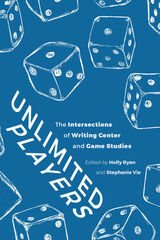
The collection opens with theoretically driven chapters that approach writing center work through the lens of games and play. These chapters cover a range of topics, including considerations of identity, empathy, and power; productive language play during tutoring sessions; and writing center heuristics. The last section of the book includes games, written in the form of tabletop game directions, that directors can use for staff development or tutors can play with writers to help them develop their skills and practices.
No other text offers a theoretical and practical approach to theorizing and using games in the writing center. Unlimited Players provides a new perspective on the long-standing challenges facing writing center scholars and offers insight into the complex questions raised in issues of multimodality, emerging technologies, tutor education, identity construction, and many more. It will be significant to writing center directors and administrators and those who teach tutor training courses.


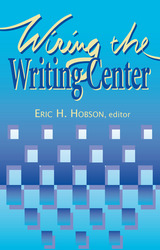
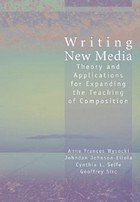
As new media mature, the changes they bring to writing in college are many and suggest implications not only for the tools of writing, but also for the contexts, personae, and conventions of writing. An especially visible change has been the increase of visual elements-from typographic flexibility to the easy use and manipulation of color and images. Another would be in the scenes of writing-web sites, presentation "slides," email, online conferencing and coursework, even help files, all reflect non-traditional venues that new media have brought to writing. By one logic, we must reconsider traditional views even of what counts as writing; a database, for example, could be a new form of written work.
The authors of Writing New Media bring these ideas and the changes they imply for writing instruction to the audience of rhetoric/composition scholars. Their aim is to expand the college writing teacher's understanding of new media and to help teachers prepare students to write effectively with new media beyond the classroom. Each chapter in the volume includes a lengthy discussion of rhetorical and technological background, and then follows with classroom-tested assignments from the authors' own teaching.
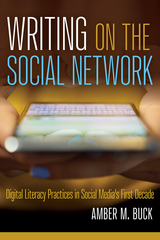
Through qualitative case study research, Buck explores how literate activities on social network sites coalesced around three areas crucial for writing in digital environments: (1) a heightened awareness of audience and an ability to tailor messages to specific audiences; (2) an understanding of how personal data is collected and circulated in online spaces; and (3) a means through which to use the first two skills for self-promotion and self-presentation in both personal and professional settings. She identifies several distinct literacy practices and strategies used by participants to communicate effectively and addresses how these strategies can help writing researchers and internet scholars understand the impact of social media’s first decade and can inform the ways they will research and understand social media’s second decade.
Social media platforms represent important locations where the different influences on writing become visible. Writing on the Social Network is a close study of the rich literate practices individuals have engaged in on social network sites over the last ten years that allows for a better understanding of the role social media plays in shaping digital literacy.
READERS
Browse our collection.
PUBLISHERS
See BiblioVault's publisher services.
STUDENT SERVICES
Files for college accessibility offices.
UChicago Accessibility Resources
home | accessibility | search | about | contact us
BiblioVault ® 2001 - 2024
The University of Chicago Press









